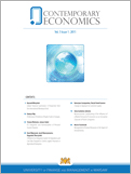Employee’s Behavioral Opportunism and
Alienation: Exploring the Factors
Employee’s Behavioral Opportunism and
Alienation: Exploring the Factors
Author(s): Dmitry Pletnev, Elena KozlovaSubject(s): Socio-Economic Research
Published by: Akademia Ekonomiczno-Humanistyczna w Warszawie
Keywords: Opportunism; Alienation; Management Style; Motivation; Economic measurement; Alienation degree; Adizes;
Summary/Abstract: The article aims to identify factors influencing the behavioural opportunism and alienation of Russian employees. The study is based on a survey of 298 Russian employees, conducted in October 2020. Normalized indicators were used to assess the alienation degree, opportunism willingness and opportunism level, based on processing the respondents’ answers; the Z-test was used for statistical analysis of these indicators, and to examine the influence of 14 social and organizational factors on alienation and opportunism. The study showed that employees’ alienation degree is influenced by marital status, having children, motivation type, organization size, work in a managerial position, position and salary improvement, and Adizes’ management styles. Their opportunism willingness is influenced by gender, age, management style, organization-side work experience, and position improvement. The results support the hypotheses of the interdependence of opportunism level and age, marital status, motivation type, organization size, and salary improvement. It was found that education level, job profile and diploma compliance, and ownership do not affect alienation and opportunism. The research results can help develop corporate programmes to increase employees’ involvement in solving corporate problems and reducing opportunism.
Journal: Contemporary Economics
- Issue Year: 16/2022
- Issue No: 1
- Page Range: 106-120
- Page Count: 15
- Language: English

